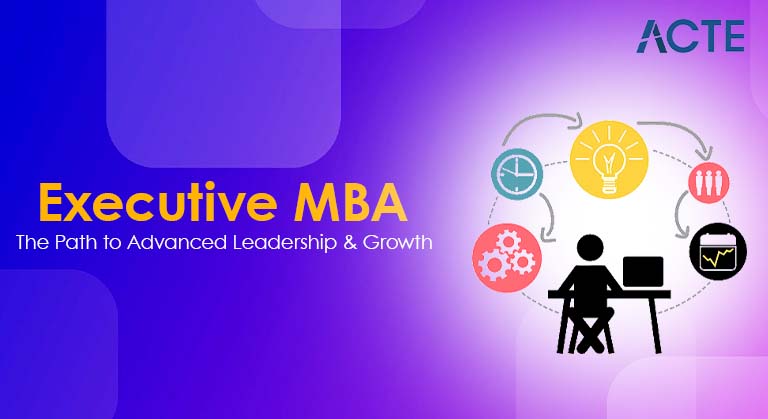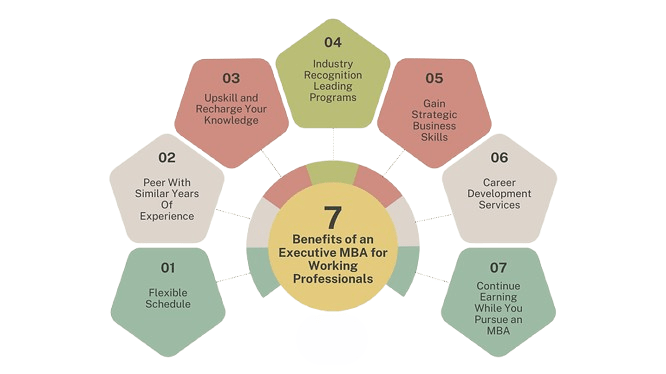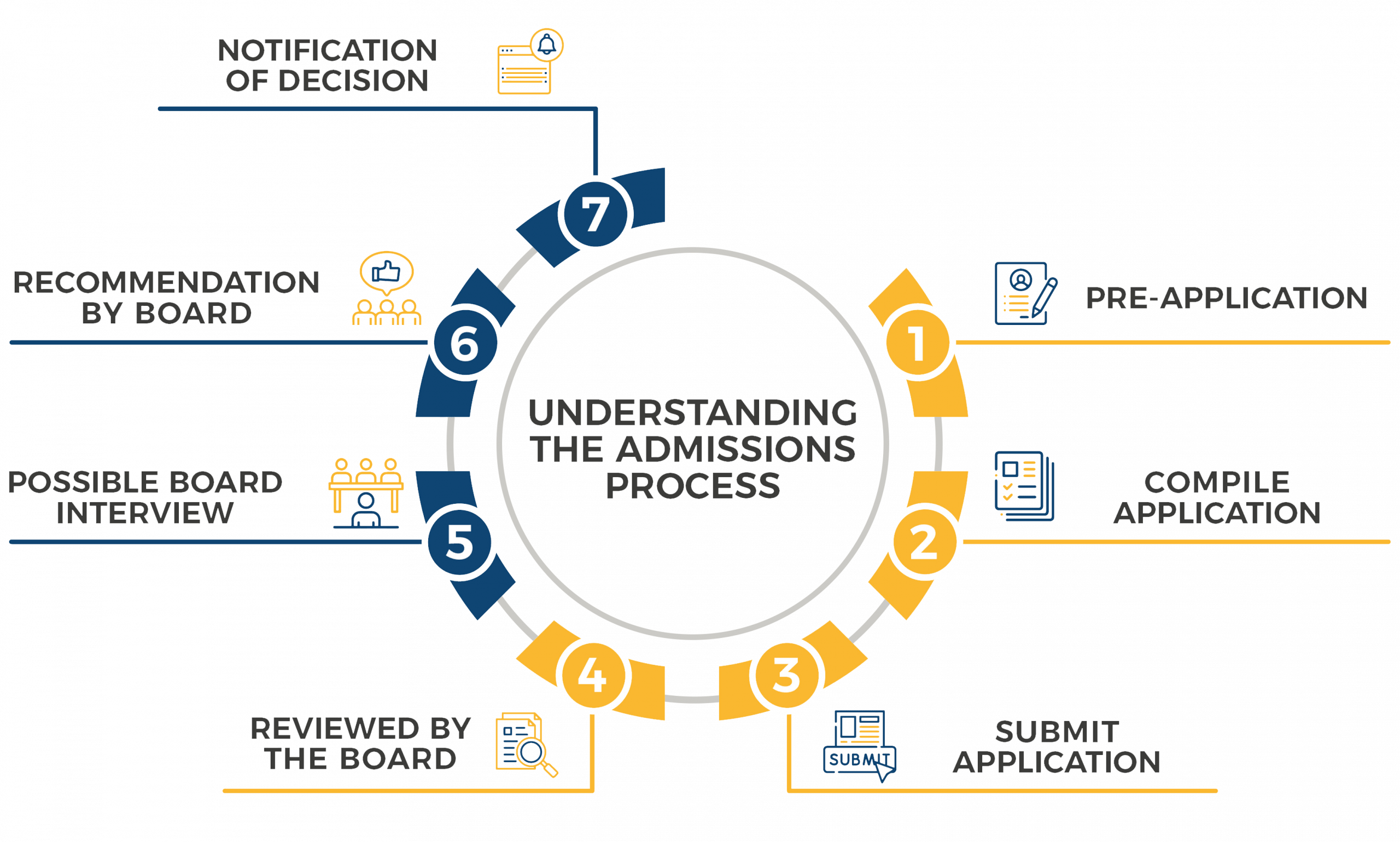
- Overview of Executive MBA
- Who Should Pursue It?
- Eligibility & Work Experience
- Top Executive MBA Programs
- Admission Process
- Curriculum Design
- Duration & Flexibility
- Cost vs ROI
Overview of Executive MBA
An Executive MBA (EMBA) is a graduate-level business degree designed specifically for experienced professionals, executives, and managers seeking to advance their leadership skills and strategic thinking without pausing their careers. Unlike traditional MBA programs, EMBA courses are typically structured around flexible schedules, such as weekend or modular formats, allowing participants to balance work, study, and personal commitments. The curriculum focuses on core business disciplines like finance, marketing, operations, and leadership, with a strong emphasis on real-world application, global perspective, and innovation, and often complements professional certifications such as PMP training to enhance project management expertise. Participants benefit from peer-to-peer learning, often studying alongside professionals from diverse industries and backgrounds, fostering a collaborative and enriching environment. EMBA programs frequently incorporate international modules, executive coaching, and capstone projects to provide hands-on, practical experience. Admissions usually require substantial work experience, reflecting the advanced nature of the program and its focus on developing high-level managerial and leadership capabilities. Ideal for mid-to-senior-level professionals aiming to transition into top executive roles or entrepreneurs seeking to scale their ventures, an Executive MBA enhances both personal and organizational impact. Graduates emerge with a broader strategic outlook, stronger decision-making skills, and an influential network, positioning them for greater responsibility and success in an increasingly complex global business environment.
To Explore PMP in Depth, Check Out Our Comprehensive PMP Certification Training To Gain Insights From Our Experts!
Who Should Pursue It?
- Mid-to-Senior-Level Managers: Professionals who have progressed beyond operational roles and are leading teams or departments, aiming for executive leadership positions.
- Entrepreneurs and Business Owners: Individuals who run their ventures and want to gain advanced business knowledge to scale, diversify, or innovate more effectively.
- Technical Experts Moving into Leadership: Engineers, scientists, or IT specialists seeking to complement their technical skills with strategic business and leadership capabilities.
An Executive MBA (EMBA) is ideal for experienced professionals who want to enhance their leadership skills, expand their strategic thinking, and drive growth within their organizations, all without pausing their careers. It caters to individuals who bring a wealth of work experience and are ready to take on more significant leadership roles. For those exploring advanced business education, understanding What is an MBA can help clarify how an EMBA differs from traditional MBA programs in structure, focus, and outcomes. Here are six types of professionals who should consider pursuing an EMBA:

- Professionals Seeking Career Advancement: Those aiming for C-suite roles such as CEO, CFO, or COO, and looking for formal training in executive decision-making and organizational strategy.
- Global Professionals: Individuals working in or aspiring to work in multinational environments who need a broader understanding of global markets and cross-cultural leadership.
- Career Changers: Professionals with significant experience in one field who are looking to pivot into a new industry or function, using the EMBA as a bridge to new opportunities.
Eligibility & Work Experience
Eligibility for an Executive MBA (EMBA) program primarily focuses on a candidate’s professional experience, leadership potential, and ability to contribute to a high-level learning environment. Most EMBA programs require applicants to have between 5 to 10 years of full-time work experience, with a strong preference for those in mid-to-senior management roles. A recognized bachelor’s degree is typically necessary, although some institutions may consider candidates without one if they have demonstrated exceptional career accomplishments. Leadership experience is a key criterion, as programs look for individuals who have managed teams, led projects, or played a significant role in strategic business initiatives. For professionals exploring growth opportunities, understanding the Best Career Options after MBA can help align an EMBA with their long-term goals and maximize return on investment. Applicants are also expected to have managerial responsibilities that involve decision-making, resource allocation, or operational oversight. Employer support is often encouraged or required, as it reflects the organization’s commitment to the candidate’s development and may include flexible work arrangements or financial sponsorship. Additionally, a solid track record of professional achievements, such as promotions, innovation, or measurable impact in one’s field, can greatly strengthen an application. Overall, EMBA programs seek driven, accomplished professionals who are ready to enhance their strategic thinking, broaden their leadership capabilities, and contribute diverse perspectives to a collaborative, executive-level learning environment.
Are You Preparing for PMP Jobs? Check Out ACTE’s Project Management Interview Questions & Answer to Boost Your Preparation!
Top Executive MBA Programs
- The Wharton School (University of Pennsylvania): Known for its strong finance and leadership curriculum, Wharton’s EMBA offers campuses in Philadelphia and San Francisco, with a global perspective and access to a powerful alumni network.
- INSEAD Global Executive MBA: With campuses in Europe, Asia, and the Middle East, INSEAD offers a truly global learning experience, emphasizing international business and cultural diversity.
- London Business School (LBS): LBS offers one of Europe’s top EMBA programs, with flexible schedules, global modules, and a focus on leadership and innovation in international business.
Top Executive MBA (EMBA) programs are designed for high-achieving professionals aiming to elevate their leadership and strategic capabilities on a global scale. These programs are often offered by prestigious business schools and are recognized for their rigorous academics, international exposure, and strong alumni networks. For professionals considering long-term growth, understanding the Future of MBA in International Business Scope can help align their EMBA choices with emerging global trends and opportunities. Here are six of the most highly regarded Executive MBA programs worldwide:
- Chicago Booth School of Business: Booth’s EMBA program emphasizes analytical thinking and offers campuses in Chicago, London, and Hong Kong, enabling a global business education.
- Kellogg-HKUST Executive MBA: A partnership between Northwestern University and Hong Kong University of Science and Technology, this program is highly ranked for its global focus and senior-level peer group.
- IESE Business School (University of Navarra): Based in Spain with global modules, IESE’s EMBA is noted for its case-method teaching and strong ethical and leadership foundation.
- Business for Women Entrepreneurs: EMBA programs help women entrepreneurs grow their businesses, gain leadership skills, and access networks and resources tailored to their unique challenges.
- Core Business Fundamentals: Courses in finance, marketing, operations, strategy, and accounting form the foundation, ensuring all participants have a strong grasp of essential business disciplines.
- Leadership and Executive Development: Specialized modules focus on leadership, change management, emotional intelligence, and decision-making to prepare students for high-impact roles.
- Global Business Perspective:Many programs include international residencies or global modules that expose students to diverse markets, cultures, and business practices.
- Electives and Specializations: EMBA students often have the option to tailor their learning through electives in areas like entrepreneurship, digital transformation, or healthcare management.
- Capstone Projects and Applied Learning: Real-world consulting projects, strategic initiatives, or entrepreneurial ventures allow students to apply knowledge directly to complex business problems.
- Integrated Learning Format: Courses are delivered in a modular or weekend format, blending in-person, online, and hybrid sessions to accommodate busy professionals.
Are You Interested in Learning More About PMP? Sign Up For Our PMP Certification Training Today!
Admission Process
The admission process for an Executive MBA (EMBA) program is designed to evaluate a candidate’s professional achievements, leadership potential, and readiness for advanced business education. It typically begins with an online application, which includes submitting academic transcripts, a detailed resume, and one or more essays outlining career goals, motivations for pursuing an EMBA, and how the program aligns with professional aspirations. Many applicants also highlight professional certifications such as PMP training to showcase project management expertise and leadership capabilities. Most schools require letters of recommendation, often from current or former supervisors, to assess the applicant’s leadership qualities and contributions at work. A personal or video interview is usually part of the process, providing an opportunity for the admissions committee to evaluate interpersonal skills, clarity of goals, and cultural fit with the program. Some programs may request standardized test scores such as the GMAT or Executive Assessment (EA), although many waive these requirements based on work experience or prior academic performance. Employer support or a letter of endorsement may also be required, acknowledging the time commitment and, in some cases, financial backing. Throughout the process, applicants are evaluated holistically, with significant weight given to career progression, strategic mindset, and the ability to contribute to a collaborative, executive-level classroom. Admission is competitive, reflecting the high caliber of professionals these programs attract.

Curriculum Design
The curriculum design of an Executive MBA (EMBA) program is strategically developed to equip experienced professionals with advanced business knowledge, leadership skills, and a global perspective without interrupting their careers. EMBA programs combine academic rigor with practical application, enabling participants to immediately apply what they learn to real-world business challenges. For those exploring program options, researching the Best MBA Colleges in India can provide insights into top institutions that offer high-quality EMBA experiences. Here are six key components commonly found in EMBA curriculum design:
Duration & Flexibility
The duration & flexibility of an Executive MBA (EMBA) program are key features that make it ideal for working professionals seeking to advance their careers without stepping away from their current roles. Most EMBA programs are designed to be completed within 16 to 24 months, allowing participants to balance academic commitments with full-time employment. Classes are typically scheduled in a modular, weekend, or residency format, often held once or twice a month over extended weekends or in week-long blocks, minimizing disruption to work and personal responsibilities. Many programs also offer blended learning models that combine in-person sessions with online components, providing additional flexibility for travel or remote participation. Understanding the Learn Objectives of Management Accounting can help EMBA participants apply financial insights effectively in strategic decision-making, budget planning, and performance evaluation within their organizations. Additionally, understanding the future of MBA in international business scope can help professionals choose programs that align with evolving global market trends and maximize long-term career opportunities. Some top global EMBA programs offer multiple campuses or international modules, giving students the option to study in different locations based on their availability and interests. The structure is intentionally designed to support time management and adaptability, often including support services such as academic advising and peer group collaboration to enhance learning without overwhelming students. This flexible yet structured format enables participants to immediately apply classroom knowledge to their professional environments, maximizing both personal growth and workplace impact while earning a prestigious graduate degree in a manageable timeframe.
Are You Considering Pursuing a Master’s Degree in PMP? Enroll in the PMP Masters Program Training Course Today!
Cost vs ROI
The cost of an Executive MBA (EMBA) program can range from $80,000 to over $200,000, depending on the institution, location, and program structure, making it a significant financial investment. However, the return on investment (ROI) is often substantial, particularly for professionals aiming to accelerate their careers, transition into executive leadership, or expand their global business exposure. Many EMBA programs also complement professional certifications like PMP training adding project management expertise that further enhances career prospects and ROI. The ROI of an EMBA goes beyond immediate salary increases, though many graduates do report notable post-graduation compensation growth; it also includes long-term career advancement, enhanced strategic thinking, expanded professional networks, and increased opportunities for leadership roles. Many employers recognize the value of an EMBA and may offer partial sponsorships, promotions, or greater responsibilities in return for the knowledge and insights brought back into the organization. Additionally, the global alumni networks, peer learning, and access to executive career services contribute to lasting professional benefits. For entrepreneurs, including those focused on business for women entrepreneurs, the ROI often comes in the form of smarter business growth, better decision-making, and access to investment or partnership opportunities. Programs offering tailored support in business for women entrepreneurs are becoming increasingly popular, helping female professionals overcome unique business challenges and build successful ventures through targeted mentorship, resources, and community connections. While the upfront cost may be high, the EMBA is widely seen as a powerful catalyst for long-term career growth and financial return, especially for those who strategically apply their learning and connections post-graduation.

